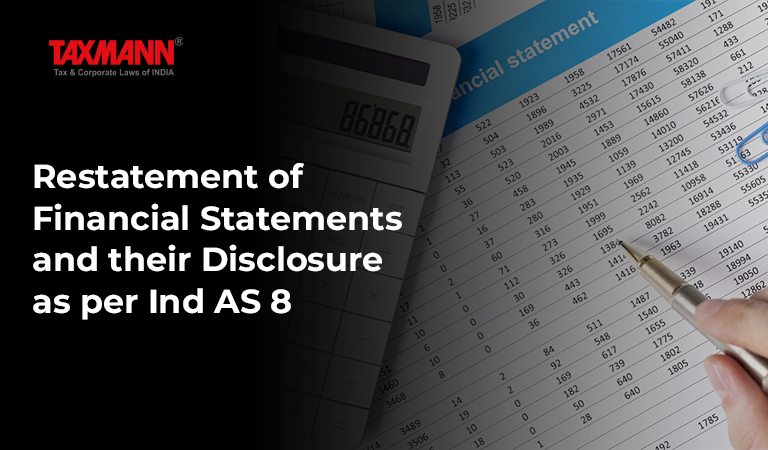Restatement of Financial Statements and their Disclosure as per Ind AS 8
- News|Blog|Account & Audit|
- 2 Min Read
- By Taxmann
- |
- Last Updated on 28 May, 2022

Where the financial statements of an enterprise contain either material errors or immaterial errors made intentionally or unintentionally to achieve a particular presentation of an entity’s financial position, financial performance, or cash flows, then the said financial statements are considered to be in non-compliance with Ind ASs. It may happen that the potential current period errors discovered in a particular period are corrected before the financial statements are approved for issue. But in some cases, material errors are left undiscovered until a subsequent period. Such prior period errors, when discovered, are corrected in the year of discovery, by adhering to the principles as prescribed in Ind AS 8, Accounting Policies, Changes in Accounting Estimates and Errors, as below:
Para 42 states that an entity shall correct material prior period errors retrospectively in the first set of financial statements approved for issue after their discovery by:
(a) restating the comparative amounts for the prior period(s) presented in which the error occurred; or
(b) if the error occurred before the earliest prior period presented, restating the opening balances of assets, liabilities, and equity for the earliest prior period presented.
For Example, While preparing the financial statements for the year 2021-22 (current year), if any material error is discovered for the year 2018-19 (the year before the earliest prior period), then the financial statements of the entity is corrected by restating the opening balances of relevant assets and liabilities & relevant component of equity for the year 2020-21( earliest prior period). This will result in a consequential restatement of opening balances for the year 2021-22.
However where it is impracticable to determine either the period-specific effects, the cumulative effect of the error, or the amount of an error, then an entity shall :
(a) In case of the period-specific effects of an error is impracticable to determine, the entity shall restate the opening balances of assets, liabilities, and equity for the earliest period for which retrospective restatement is practicable (which may be the current period).
(b) In case the cumulative effect of an error is impracticable to determine, at the beginning of the current period, of an error in all prior periods, the entity shall restate the comparative information to correct the error prospectively from the earliest date practicable.
(c) In case the amount of an error for all prior periods is impracticable to determine, the entity shall restate the comparative information prospectively from the earliest date practicable
Ind AS 8 further states that the correction of a prior period error is excluded from profit or loss for the period in which the error is discovered. Any information presented about prior periods, including any historical summaries of financial data, shall be restated as far back as is practicable.
Click Here To Read The Full Story
Disclaimer: The content/information published on the website is only for general information of the user and shall not be construed as legal advice. While the Taxmann has exercised reasonable efforts to ensure the veracity of information/content published, Taxmann shall be under no liability in any manner whatsoever for incorrect information, if any.

Taxmann Publications has a dedicated in-house Research & Editorial Team. This team consists of a team of Chartered Accountants, Company Secretaries, and Lawyers. This team works under the guidance and supervision of editor-in-chief Mr Rakesh Bhargava.
The Research and Editorial Team is responsible for developing reliable and accurate content for the readers. The team follows the six-sigma approach to achieve the benchmark of zero error in its publications and research platforms. The team ensures that the following publication guidelines are thoroughly followed while developing the content:
- The statutory material is obtained only from the authorized and reliable sources
- All the latest developments in the judicial and legislative fields are covered
- Prepare the analytical write-ups on current, controversial, and important issues to help the readers to understand the concept and its implications
- Every content published by Taxmann is complete, accurate and lucid
- All evidence-based statements are supported with proper reference to Section, Circular No., Notification No. or citations
- The golden rules of grammar, style and consistency are thoroughly followed
- Font and size that’s easy to read and remain consistent across all imprint and digital publications are applied



 CA | CS | CMA
CA | CS | CMA
